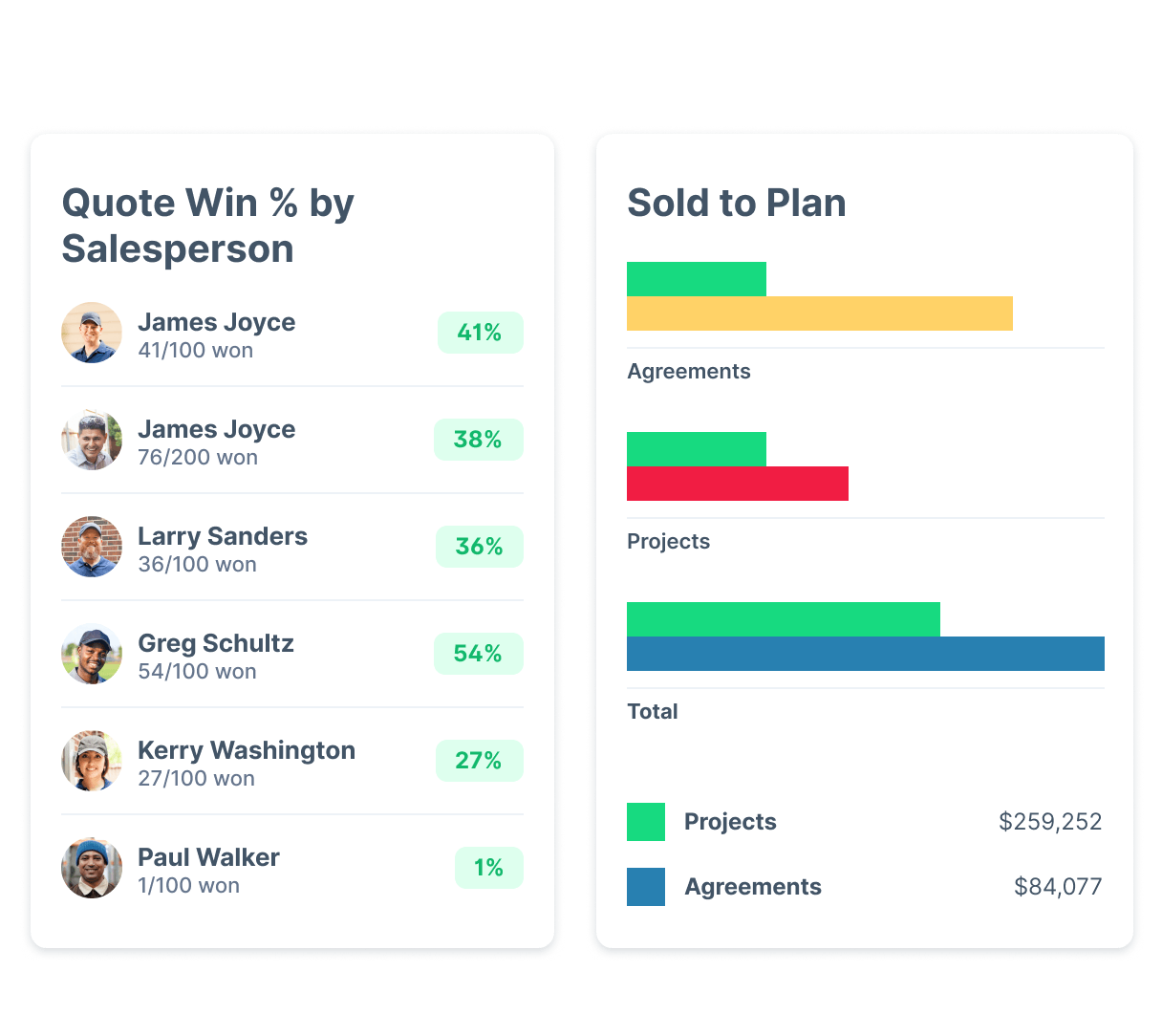HVAC CRM Software
HVAC Software
Streamline the sales process and boost your win rates with HVAC CRM software.
- Create proposals
- Manage your sales funnel
- Deliver contract commitments
- Earn more pull-through revenue

Trusted by 1300+ Happy Customers
See How Contractors Use ServiceTradeBuilt for HVAC Contractors
How we help HVAC contractors
Manage your sales with the leading HVAC CRM software for HVAC contractors.
Learn about ServiceTrade
- Track daily, weekly, and monthly progress toward sales goals.
- Streamline and measure the entire sales process with HVAC CRM software that moves accounts through sales stages.
- Report on HVAC sales KPIs like sales volume, labor hours, prospecting activity, sales quotes and bookings, quota attainment, and more.

- Send HVAC techs or sales reps to perform sales audits.
- Apply pre-built or customizable pricing models informed by 30+ years of HVAC estimating software experience to the customer’s equipment inventory.
- Calculate agreement pricing to automatically meet your profit margin goals using parts, labor, and tasking templates.

- Assign contract pricing to set the correct markups and labor rates you’ve agreed to.
- Establish a service schedule for the maintenance and projects you’ve agreed to deliver.
- Monitor contract performance to ensure delivery and financial performance in customer relationship management software.
- Share online service reports that show work completed, deficiencies, and repair quotes.
- Offer an online portal where customers see their service history.

- Guide field techs through task lists that help them record repair opportunities with videos, pictures, and notes that describe the problem.
- Turn repair opportunities into repair quotes for high-margin repair work.
- Schedule the repair job and earn the revenue in one end-to-end process.

- Track daily, weekly, and monthly progress toward sales goals.
- Streamline and measure the entire sales process with HVAC CRM software that moves accounts through sales stages.
- Report on HVAC sales KPIs like sales volume, labor hours, prospecting activity, sales quotes and bookings, quota attainment, and more.

- Send HVAC techs or sales reps to perform sales audits.
- Apply pre-built or customizable pricing models informed by 30+ years of HVAC estimating software experience to the customer’s equipment inventory.
- Calculate agreement pricing to automatically meet your profit margin goals using parts, labor, and tasking templates.

- Assign contract pricing to set the correct markups and labor rates you’ve agreed to.
- Establish a service schedule for the maintenance and projects you’ve agreed to deliver.
- Monitor contract performance to ensure delivery and financial performance in customer relationship management software.
- Share online service reports that show work completed, deficiencies, and repair quotes.
- Offer an online portal where customers see their service history.

- Guide field techs through task lists that help them record repair opportunities with videos, pictures, and notes that describe the problem.
- Turn repair opportunities into repair quotes for high-margin repair work.
- Schedule the repair job and earn the revenue in one end-to-end process.
How CRM Software Helps Businesses Like Yours
Capture the details of the maintenance agreement so the work gets done on time and at the right price.
Learn MoreSet field techs up with task lists to perform maintenance correctly and to report equipment issues that will increase your pull-through revenue.
Field Technician ProductivityGain visibility and control of your contract performance to remove issues that get in the way of customer satisfaction and profitability.
Learn MoreImprove sales efficiency to win more high-margin maintenance agreements from your ideal clients and earn more profitable pull-through work.
Learn MoreOffer an online portal through your customer relationship management software that keeps clients informed as you deliver contracted services to reduce service questions and invoice disputes.
Learn MoreFAQ
Looking for help with HVAC CRM software?
HVAC CRM software refers to customer relationship management software. It is a type of application that allows businesses to manage various aspects of dealing with customers. For HVAC contractors, HVAC CRM software manages the sales funnel, creates proposals for maintenance agreements, manages the delivery of contracted services, and manages repair opportunities that convert into high-margin repair revenue.
HVAC CRM software improves customer relationship management by enabling personalized customer experiences and improving satisfaction through centralized access to customer data and two-way communication tools. It manages the sales funnel efficiently with automated lead tracking and assignment, helping win and retain top customers by delivering exceptional service. Additionally, HVAC CRM software streamlines operations through streamlined communication and collaboration across teams, with all important customer information centralized in one place.
Simple Pricing
Office users are always free. Our subscription pricing lines up with your most valuable asset – technicians.
The Blog
Resources for Choosing the Best HVAC CRM Software

Growth is essential for long-term success as a commercial HVAC service provider. However, achieving growth can be challenging amid constant technological advancements, shifts in customer preferences, and ever-evolving industry regulations. In this article, we will explore ten proven strategies that HVAC businesses can implement to boost growth and stay ahead of the curve. 1. Develop […]
As a commercial HVAC service provider, streamlining your operations is crucial for maintaining efficiency and delivering top-notch service to your clients. One powerful tool that can help you achieve these goals is commercial HVAC service agreement software. In this ultimate guide, we will explore the benefits, features, and implementation process of service agreement software specifically […]
Get started today
See how ServiceTrade can give you control over your company’s operations.
Get a Demo






